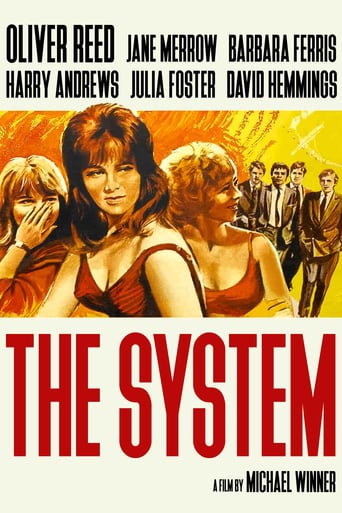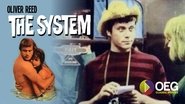Ian Brown
A neglected but in its unassuming way very well-made little melodrama by a young Michael Winner, shot mainly on location around Torbay right at the start of the Swinging Sixties era. Fairly racy in its day, it never tries to sensationalise its premise that casual sex is as normal as the twist among the holidaying young people.The cast is exceptional. This was Winner's first collaboration with Oliver Reed, whose charisma and aura of watchful menace here is unmistakable. There was never another star in British cinema quite like him. Jane Merrow is just as excellent as the sympathetic but ultimately unattainable Nicola; she makes the character totally three-dimensional without any histrionics. Barbara Ferris also stands out among a talented young cast, especially in her final stoned lament at the evening beach-party.Winner is helped immeasurably by a brilliant cinematographer, Nicolas Roeg (here in between lensing such notable Brit-flicks as The Caretaker, Nothing But the Best and Masque of the Red Death). His location work right from the title sequence gives a vivid sense of place of a jaded seaside resort in the last days of summer.Directorial flair is surprisingly confident, borrowing just enough new-wave technique to languidly establish the film's youth pedigree without ever indulging in obtrusive effect for its own sake.Winner's previous film, West 11, a lowlife murder suspensor, also made good use of a mainly young cast. After The System he moved on to bigger but not necessarily better things before Hollywood swamped what talent he had. A pity, because this film, never acknowledged as being one of the best British b-films of the time, really is pretty good.
FilmFlaneur
Given director Michael Winner's critical reputation today, it's hard to remember that he, too, once enjoyed a moment in the sun. For a brief period at the start of the 1960s, the director received good reviews on both side of the Atlantic, most especially from the American critics impressed by his ability to adapt very contemporary subject matter and make it appeal to an international youth audience. In particular, The System, followed in turn by The Jokers (1966), and then I'll Never Forget What's'isname (1967), attracted attention. All three films starred Oliver Reed, cast after Winner had spotted the potential of the actor who had previously appeared in Hammer horror films.Overshadowed by the slackness and crudity of some of his later, more ambitious projects, these early titles are overlooked. But for The System, at the time of its release, Newsweek praised Winner as the unheralded director of a "consistently intelligent and often brilliant low-budget import." Seen today it can be identified as part of a group of films that have interesting anticipations of each other within British cinema. In the film Reed plays 'Tinker' a seaside photographer, the charismatic leader of a group of young men seeking sexual conquest at the seaside.The System, unsubtly re-titled The Girl-Getters for the USA, was felt to be controversial in subject matter at the time, although by today's standards it is pretty mild. Reed had earlier appeared as a tearaway in another resort-set movie, Losey's cult item The Damned (1961); in the present film it is almost as if the young thug from the previous story has moved on a little to a newly precarious living, at least as far as he might be able to. The character Tinker is much more self-confessional in the present movie, and to that extent has attracted comparisons to Alfie (1966), which took the self-examination of a moral vacuum to a much greater level. The System co-stars some well-known names: John Alderton, Harry Andrews, and Derek Nimmo all appear.Originally, Julie Christie was slated to appear too as Tinker's posh love interest Nicola, but unfortunately this deal fell through and the role was taken by Jane Merrow. There's also a young David Hemmings, playing a relative on his first trip to the sexually exploitative seaside. Two years later the actor was to star in another film in which photography is also at the centre of activity, Antonioni's Blow Up. In The System there is reference to 'the takers and the taken' extending the photographic metaphor, but unlike in the 1966 movie there is no doubt as to what we are seeing. And Tinker leaves his exposed negatives to the mercies of a commercial developer, away from private obsession.The 'system' in question is the methodical way the group of friends play the 'grockles' (their name for holidaymakers). As they admit, they have to "take what they can from the visitors (to) prepare for the cold winter." Filmed in Torquay and Brixham, Winner's film is rich on location and atmosphere, effects helped immeasurably by the widescreen work of cinematographer Nicolas Roeg. Reed proves his stature as a star in a film that is, ultimately, all about him. From the first sight of him in a seaside hat, camera in hand, lounging on a railway platform, he is rarely off screen. His magnetic appearance makes one overlook the inelegance displayed on the dance floor in one scene (the manic moves of which recall his short-lived appearance back in Beat Girl, 1959).Tinker is someone who, at the start of the film at least, is confident in his own motives and position in life; one who has preyed and succeeded repeatedly over the brief four-month holiday season. As the story progresses, however, he will discover that his position is more circumscribed than he thought and that, judged by his own standards and motives; he can find situations painfully reversed. Tinker has relationships with three main women during the course of the film: the wife of the local seaside comedian (his 'winter bird'); with Lorna, a naïve single tourist (Julia Foster); and a visiting rich man's daughter Nicola.One of the most interesting points of the film is how readily the case-hardened Tinker falls for Nicola. Is his sudden vulnerability a symptom of underlying self-deception, or has the promiscuous photographer merely overreached himself socially as well as emotionally? Humiliated during a game of tennis with Nicola's rich friends, away from the sexual shenanigans at the beach, Tinker is confronted with another system: the class war. When blowing bubbles back and forth during his curious 'seduction' of his Nicola in his room earlier, Tinker had nothing to lose; by contrast the strike of a tennis ball into his face proves painful on more than one level, as a reminder of his limitations.In his memoir Winner Takes All the director says that The System "changed my life" - that is laid the foundations, after previous false starts, for a successful career as filmmaker. Star, Reed, too, was to go on and find fame and fortune - at least until his drink-related behaviour got the better of him and he became a parody of his earlier, dynamic self. Co-star Jane Merrow sadly failed to capitalise on her success here, and drifted into television and obscurity. The film itself, after its initial period of praise and notoriety, vanished into the never-land of rare screenings on TV and so its belated appearance on DVD, albeit without extras, is to be welcomed. Although now dated in some elements, it remains a reminder of the hidden strengths of British cinema of the 1960s and a related part of the 'social problem' cycle of the time.
christopher-underwood
You might think that by 1964 the world was all swinging sophistication, but no it was like this, I remember. I had recently started working, in a bank. It was hand written ledgers and an outside toilet! Yep, life revolved a fair bit around getting girls and then making sure you didn't get them pregnant and then 'having to get married'. Everyone is s bit too old here, of course, although David Hemmings looks like a little angel. Oliver Reed puts in a good performance as the leader although it's hard at the end to take his more introspective ponderings. Great direction by Michael Winner, there not many people have said that, and the movie speeds along with some excellent sequences, especially the wedding celebration on the beach, played more like a wake. Winner is an under rated director, he did a couple of others of this ilk, then I like his Innocents and there is Death Wish. I liked the hated Death Weekend but in general his career went downhill and it stops people giving the earlier films a chance. Well worth watching, if only to appreciate that the mid 60's in Britain were still much like the 50's, except with teenagers.
Peter Thornhill
As a young man in his late teens, this film brings back fond memories of Torquay and Paignton where the film was made.It all started on Elberry Cove, near Goodrington, with a big, all night barbecue. It was supposed to be a warm summers evening, which was not quite the case, but it was a lot of fun.I was there as an Extra with Naomi, the daughter of the late Don Kite (Film director) Most of the activity of this film took place around Paignton Harbour and in fact Tinker's Pad or Flat was the Harbour Lights Restaurant. For all us teens, the 400 Club in Torquay, was the place to go. In fact it was the only place that had disco type dancing. And the 400 Club played a big part in the film, with a fight and scuffle, the we had to drag Tinker across the road and throw him in the harbour, I can't actually remember whether we did or not, but I know that his camera went in.This film was probably very close to the truth, you get the feeling that the Writer, Peter Draper had been following us about taking notes on our activities throughout the summer months, particularly as we used to go down to Elberry Cove for barbeque's and dancing at the 400 ClubI give this film 8 for the memories





